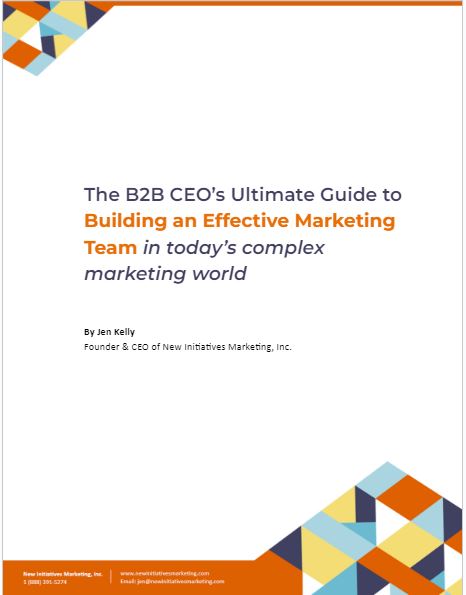Simply creating a marketing strategy is not enough. A strategy is just a theoretical exercise that can sit on the shelf for days, months and years. Once your marketing strategy is in place, things must happen to bring about the desired change – that is the point of it all. The wonderful combination of visualization, glamour of naval gazing, sparks of inspiration, and cranial gymnastics can produce an exceptional strategy and plan. It can all be entertaining and even fascinating. But until excellent marketing execution makes it actually happen, all is for naught.
Execution makes all the necessary elements of marketing work to bring strategy to life. For example, tradeshows, advertising, public relations, social media contribution and a blog can coordinate to generate leads. Each element needs all details covered and properly contributing to make the plan live and produce results.
Just as a symphony orchestra, quartet, or trio brings together skill and expertise of diverse instruments, marketing execution draws on an immense range of specific and specialized skills. Each musician gets variable use through a performance as does each marketing element.
The orchestra or any band performance is based on the work of a composer, or we would never be stirred by and entertained with the result. That composition or music plan must be well played, recorded and produced before we can bob our heads to the beat of a hit song. Execution gets that done.
The conductor and producer execute the plan to produce a hit. Marketing execution makes the strategy a success.
The strategy and plan are as essential as the notes on the composer’s sheet music and each represents potential. Execution brings the oxygen in to give it life and deliver the results.
Six Essential Marketing Execution Tips:
1. The Importance of Adaptability in Marketing Execution
While a well-laid marketing plan sets the stage, the marketing landscape is ever-changing. Whether it’s emerging social media platforms, shifts in consumer behavior, or updates in search engine algorithms, the execution phase must be adaptable. Being rigid in your approach can lead to missed opportunities and wasted efforts.
2. The Role of Data in Fine-Tuning Execution
Data analytics play an indispensable role in marketing execution. Tools like Google Analytics, CRM software, and specialized marketing platforms can provide real-time insights into how each element of your strategy is performing. This data can be invaluable for making on-the-fly adjustments to optimize your outcomes. It’s not just about setting the plan in motion; it’s about constantly refining it.
3. Balancing Automation and Human Touch
In our technologically-driven world, automation tools can handle repetitive tasks like sending emails, posting social media updates, or even segmenting audiences. However, relying solely on automation can rob your marketing strategy of the human touch that builds genuine relationships. Balanced marketing execution marries automation with personal engagement, ensuring that your brand remains relatable and authentic.
4. Aligning Marketing Execution With Sales Goals
One common pitfall in marketing execution is a disconnect between marketing and sales objectives. The best marketing strategies don’t just aim for brand awareness; they aim for conversions. Tight collaboration between marketing and sales teams ensures that lead generation efforts are geared toward qualified prospects, thereby improving the efficiency of the sales pipeline.
5. Evaluating and Adjusting Your Strategy
Even after execution has begun, your strategy is not set in stone. In fact, the initial execution phase can provide valuable feedback for strategic adjustments. Key Performance Indicators (KPIs) should be monitored closely, and strategies should be agile enough to adapt to unexpected market conditions or performance outcomes.
6. The Role of Leadership in Marketing Execution
Leadership plays a crucial role in ensuring that the marketing strategy is well-executed. A strong leader can keep the team focused, resolve conflicts, and make critical decisions quickly. They act as the conductor in your marketing orchestra, ensuring every instrument plays its part at the right time and pitch to create a harmonious melody that resonates with your audience.
Your Options for Marketing Execution:
While you need a strong marketing leader to set the strategy and guide the ship, marketing execution can’t happen without the right team of specialists and tacticians in place. And the team and skills you need depend on the specifics of the strategy you’re executing. So how do you identify the right members of your marketing orchestra? What are your options for executing your marketing strategy?
If you don’t already have a full B2B marketing team of skilled tacticians in place, your options are to hire in-house or to outsource. If you choose to outsource, your options include:
- Fractional Chief Marketing Officer (CMO): This is a part-time Chief Marketing Officer who works for you on a contract basis. This is a great option if you don’t have a marketing leader in place, and need someone who can create your marketing strategy and help you select team of skilled marketing experts to execute the strategy.
- Fractional CMO & Expert B2B Marketing Team: Some Fractional CMOs may also have an expert B2B marketing team of their own in place. This is a good option when you don’t have a senior leader in place, or as an option to support the senior leader and guide the marketing execution.
- Marketing Agencies: Marketing agencies usually specialized in a specific tactical area, such as SEO, content, graphic design, website development, or online advertising. Marketing agencies are a great option if you have a Chief Marketing Officer or Fractional CMO already in place who has set the marketing strategy and can manage the agency’s execution and make sure everything they do is integrated and on brand.
- Contractors, Consultants and Freelancers: While marketing agencies are companies with teams of people, contractors, consultants and freelancers are individual specialists who can be hired on a short-term project basis for various parts of marketing execution. Some of the most common contractors include writers and graphic designers.
Next Steps: The CEO’s Ultimate Guide to Building a B2B Marketing Team in Today’s Complex Marketing World
To guide you in choosing your best options around marketing execution and building your right marketing team, we’ve created a comprehensive 33-page eBook: The CEO’s Ultimate Guide to Building a B2B Marketing Team in Today’s Complex Marketing World
In this eBook, we walk you through the six most important questions B2B CEOs need to answer in order to build their first marketing team and choose the right B2B marketing model for their stage of business:
- How Do You Know It’s Time to Invest in Marketing?
- What are B2B Marketing Best Practices?
- How Has B2B Marketing Become More Complex?
- What Are the Top Challenges in Getting Started in Marketing?
- What Does a B2B Marketing Team Look Like?
- Should You Hire In-House or Outsource?
You can download the eBook RIGHT HERE.
If you have any questions about this blog post or the eBook or would like to schedule a consultation with Jen Kelly, NIM’s Founder and one of the Fractional CMOs to get more guidance around your next steps in marketing, you can send her an email RIGHT HERE or book a consultation time RIGHT HERE.
Jen Kelly leads New Initiatives Marketing, Inc., a Fractional CMO & Expert B2B Marketing Team company. Since 2009, our team of senior marketing leaders and expert marketing specialists has been helping B2B CEOs with the strategic leadership and real-world marketing execution needed for practical, long-term results. Sign up for our Ask a Fractional CMO Newsletter to follow my answers to the top questions from our B2B CEO clients and followers.


